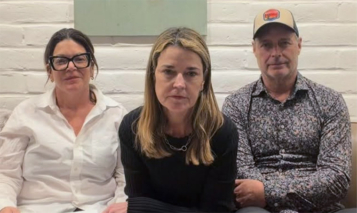
Surveillance video shows the final, excruciating moments of Army veteran Elliott Williams’ life as he lay paralyzed on the cold concrete floor of a Tulsa jail cell.
A mental health worker would later tell Williams’ father, “He’s acting like he’s paralyzed, but we know he’s not.”
Williams died 6 days after he was arrested at a Marriott hotel on Oct. 21, 2011. He was staying with his parents after the breakup of his marriage. He later checked into the Marriott Hotel, where he appeared to have a mental breakdown in a hotel lobby. Hotel staff called the police.
Two police officers arrived soon after. Williams’ parents, Earl and Katha, informed the cops that he had a history of mental illness. Williams wasn’t making sense, one of the officers noted in the police report.
Earl Williams told the police Elliott’s wife recently left him and he hadn’t slept in days.
“Eliah is out of my life, she is out of my life, take a shot,” Elliott Williams allegedly told police. “What is wrong with you all, are you scared? It’s a suicide; do I need to provoke you?”
Officer Benjamin Wolery would later say Williams took a “threatening” step toward him. Another cop, Jack Wells, peppered sprayed Williams and knocked him to the ground.
According to the OSBI report, Wells pressed his knee into Williams’ back as Williams lay face down on the ground.
Earl said he saw his son’s foot dragging when the officers raised him up and took him to a patrol unit.
When the cops placed Williams in the back of the unit, he told his father he loved him. That was the last time the 2 men spoke.
The next morning, at the jail’s booking area, Wells slammed Williams to the floor. He later told OSBI he “landed on top of Elliott’s shoulder and head,” but that the prisoner “appeared to be fine with no injuries.”
Surveillance footage captured Williams struggling to stand. “At this time it is obvious that Williams is having a difficult time standing,” a sheriff’s deputy noted in a report.
Other deputies noted Williams appeared to be suffering from a brain injury. He was incoherent and he may have had a seizure.
The report claimed Williams “rammed his head into a glass window on the cell door” after being taken to a holding cell.
Williams told nurses he felt like his neck was broken. But a nurse noted Williams was “fine” and he may be faking his injuries.
A jail captain checked on Williams and observed that he had defecated and urinated on himself.
Williams was later hoisted onto a gurney and taken to a shower, where a nurse told him he should be “ashamed of himself” for faking paralysis.
Williams was “dumped” off the gurney and onto the shower floor where he lay for an your.
The jail’s then-Chief Deputy Michelle Robinette later said in a deposition, that the jailers’ conduct was wrong “Because you don’t dump people off of gurneys.”
The jail captain testified that Williams “would not stand up but we did give him a shower anyway,”
Another officer said he saw Williams lying face down in the shower, screaming, “Help me!”
After the shower, Williams was taken back to a cell, where he lay naked on a bed. A cup of water was placed out of his reach. He attempted in vain to reach for the cup.
On Oct. 24, a nurse reported that Williams was lying on a bed naked and refusing to speak. Another nurse stated Williams “acted as if paralyzed, saying ‘I want water.’”
At around 8:30 a.m., two officers dragged Williams on a blanket to his new cell and placed a Styrofoam cup of water at his feet, again out of his reach.
“This was the only cup of water placed in [the cell] from October 25 to the time that Mr. Williams died on October 27,” court papers allege.
Deputies would later testify that they tossed containers of food into Williams’ cell. But he couldn’t reach the containers. Video footage shows him struggling to reach the food.
When his father, Earl, called the jail, he was told he couldn’t visit Elliott because of his condition.
On Oct. 26, around 7:30 a.m., a mental health counselor visited Williams in his cell. She taunted him, saying, “if he wanted to be bailed out by his parents… he would have to walk to the car,” court records show.
A psychiatrist who met with Williams said the inmate “demanded a bucket of water to drink.” It was the first and last time the psychiatrist saw Williams.
On the day before he died, a nurse observed Williams’ grave condition and ordered a staffer to open his cell door. But the staffer refused, noting safety concerns. The nurse gave up and left.
Three hours later, Williams desperately tried again to reach the cup of water, this time knocking the cup over and spilling the contents. The cup was never refilled.
On Oct. 27 at 5:10 a.m., a jailer dropped a third and final food container into the cell. The jailer noted Williams’ head was lying in a pool of his own saliva.
Hours later, Williams was unresponsive.
Two nurses debated whether to perform CPR on Williams. One nurse stated she would only do CPR on Williams while standing up.
The medical examiner ruled Williams’ death was due to “complications of vertebrospinal injuries due to blunt force trauma” to his head and neck.
The coroner’s report also noted Williams died from dehydration.
Attorneys for the Williams family accused the Tulsa jail officials of “deliberate indifference” to Williams’ mental and physical condition.
Court documents show a visiting doctor saw dried vomit on Williams’ face and the unopened food containers in his cell the day before he died. The doctor warned the jail’s medical director that Williams “looked sick, needed a CT scan and needed to go to the hospital.”
But the director later testified he didn’t recall the conversation.
“People just die sometimes,” the director said.





